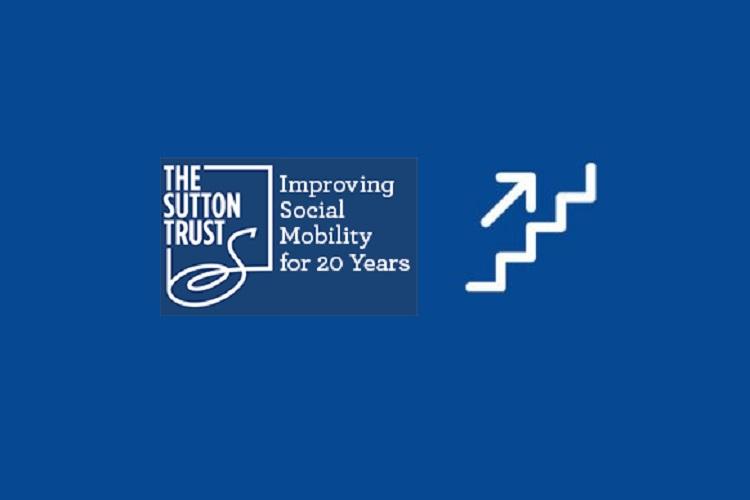Sector Response – BOOSTING SOCIAL MOBILITY TO WESTERN EUROPEAN AVERAGE COULD RAISE GDP BY £39 BILLION

Baker Dearing statement in response to The Oxera report for the Sutton Trust
Baker Dearing Educational Trust welcomes the report by Oxera for the Sutton Trust. We agree that a major factor driving the relationship between improving social mobility and economic performance is better matching between people and their jobs.
We believe that the destination of students and their employability skills when they leave school should be regarded as important as the exam results they achieve.
 Peter Wylie Director of Education, Baker Dearing Educational Trust says: “University Technical Colleges (UTCs) give students exposure to the workplace and contact with employers from the age of 14. We find this helps them develop job confidence, a mature attitude and their own professional contacts.
Peter Wylie Director of Education, Baker Dearing Educational Trust says: “University Technical Colleges (UTCs) give students exposure to the workplace and contact with employers from the age of 14. We find this helps them develop job confidence, a mature attitude and their own professional contacts.
“Students at UTCs are positive about their life chances because they are confident they have the skills employers are looking for. In a recent survey of more than 1500 UTC students 78% said links with business were better at their UTC than their previous school. 68% said the UTC helped them develop employability skills and a similar number (69%) said they are confident of getting a job when they leave education.”
Impartial, one to one careers advice is essential to help young people map their education pathway to the careers they want. Students at UTCs choose a technical education that has a clear route to University, an apprenticeships or work. In 2016 97% of UTCs stayed in education, started an apprenticeship or started a job.
If we are to improve social mobility and productivity education providers need to work more closely with employers to ensure students are developing the skills they need and that young people have contact with the world of work while they are at school.
 Commenting on new research by the Sutton Trust on social mobility, Dr Mary Bousted, general secretary of the Association of Teachers and Lecturers (ATL), said: “The Sutton Trust report shows that the public agree that Government’s treatment of the further education sector is draconian.
Commenting on new research by the Sutton Trust on social mobility, Dr Mary Bousted, general secretary of the Association of Teachers and Lecturers (ATL), said: “The Sutton Trust report shows that the public agree that Government’s treatment of the further education sector is draconian.NEW POLLING FINDS GROWING PUBLIC PESSIMISM ON SOCIAL MOBILITY
To commemorate its twentieth anniversary, the Sutton Trust is hosting a summit, ‘Social Mobility 2017’, on the 12th July. Launched at the Summit are three new research reports; “The State of Social Mobility in the UK” produced by Boston Consulting Group, “Social Mobility and Economic Success” produced by Oxera Consulting, and finally “What the Polling Says” with new survey data commissioned from Ipsos MORI.
Together they paint a picture of how social mobility in the UK has evolved through the twenty year history of the Trust, where we stand today, and where it is likely to go in the future. Survey data compiled since 1987 indicates a growing pessimism about social mobility and equal opportunities. Self-perceived mobility has been declining or stagnant throughout that period, belief that people have an equal opportunity to get ahead is on the decline, as is optimism about the prospects of the next generation compared to their parents. While this is concerning, it is indicative of how issues of mobility and fairness are increasingly to the forefront of people’s minds.
Boston Consulting Group’s report looks at the drivers of social mobility and future of work, providing an analysis of how trends in the labour market, including automation, are likely to impact on social mobility. While the automation of many routine and paraprofessional occupations poses a clear threat to mobility, increasing demand for STEM skills, a sector less dominated by the privileged than other more traditional professions, offers a clear opportunity to improve the life chances of those from disadvantaged backgrounds. Furthermore, Oxera’s analysis shows the economic imperative of working to improve social mobility, showing that raising mobility in the UK by even a modest amount would lead to substantial gains to productivity, via improved matching between jobs and skills. Taken together, the research serves to further demonstrate how vital improving social mobility is to the nation’s future.
Just a small improvement to social mobility in the UK – bringing it up to the western Europe average – could lead to an annual increase in GDP of £590 per person, according to new research by economic consultancy Oxera for the Sutton Trust. This improvement to social mobility could boost GDP by 2.1% in the long term, equivalent to around £39 billion in total.
 The Oxera report – which will be presented at the Trust’s 20th anniversary summit opened by Education Secretary Justine Greening today (12 July) – comes as new Ipsos MORI polling finds growing public pessimism about the chances of today’s young people getting further than their parents. The research is published with a new report from the Boston Consulting Group (BCG) that examines the state of social mobility in the UK and likely challenges for the future.
The Oxera report – which will be presented at the Trust’s 20th anniversary summit opened by Education Secretary Justine Greening today (12 July) – comes as new Ipsos MORI polling finds growing public pessimism about the chances of today’s young people getting further than their parents. The research is published with a new report from the Boston Consulting Group (BCG) that examines the state of social mobility in the UK and likely challenges for the future.
Oxera research: Social mobility and economic success
The Oxera report examines historical changes in social mobility in the UK and analyses the link between social mobility and economic performance. It finds that even if levels of social mobility were brought up to the level of the next best performing country in Europe – the Netherlands – the UK could expect GDP to increase by around £370 per person, or £24 billion in total.
According to the analysis, the major factor driving the relationship between improving social mobility and economic performance is better matching between people and their jobs. Oxera says: “Better social mobility means that the talents of all young people are recognised and nurtured and that some barriers to jobs – biases in recruitment processes or inequality of educational opportunity – are reduced.”
“In a more socially mobile society, it is more likely that a job will be filled by someone with the highest level of potential to perform well in that job, rather than someone who may be less well suited but, for example, better connected.” Evidence from a number of European countries summarised in today’s report confirms that those countries with higher levels of social mobility have people better matched to job opportunities and a more productive workforce.
Ipsos-MORI polling
Also published ahead of today’s summit is specially commissioned Ipsos-MORI polling that gauges public perceptions of social mobility and how best to improve it. The Trust has commissioned similar polling in previous years, which allows us to examine how attitudes have changed over time.
Highlighting a growing pessimism with respect to social mobility, just two-fifths (40%) of the 2,001 adults surveyed in 2017 agreed that people in the UK have equal opportunities to get on, a big drop on the 53% of the public who agreed with those sentiments close to a decade ago in 2008. More people (42%) now disagree than agree.
Despite talk of pessimism among young people in the UK, it was the youngest age groups that were more likely to feel they had better prospects. In fact, 40% of school-age young people from 11-16, asked separately as part of Ipsos MORI’s Young People Omnibus, felt they had better prospects than their parents. In the adult survey, 16-24 year olds were more likely to say that today’s youth would have a better life than their parents, in comparison to 25-34 year olds and 35-44 year olds (33%, compared with 26% and 25%, respectively).
There is also a low and declining percent of the public (from 43% in 2003 to 29% in 2017) who believe today’s youth will have a better quality of life than their parents, although it is important to bear in mind differences in sample sizes and survey methods between each of these three surveys. [1]
The respondents were also asked which measures would most likely improve social mobility and help disadvantaged young people get on in life. Almost half (47%) chose ‘high quality teaching in comprehensive schools’ ahead of two social mobility policies adopted by the main parties in the recent election: ‘lower university tuition fees’ (cited by 23%) and more grammar schools (8%).
Sir Peter Lampl, Chairman of the Sutton Trust and of the Education Endowment Foundation, said today:
“Britain has very low social mobility compared to other countries. Our research shows that if social mobility were brought up to the western European average, GDP would increase by 2.1%, equivalent to a monetary value of £39 billion. There is also a low and declining percent of the public (from 43% in 2003 to 29% in 2017) who believe today’s youth will have a better quality of life than their parents.
“At the Sutton Trust we have been working to improve social mobility for the last 20 years. Although progress has been made, much more needs to be done. The Government should make improving social mobility a top priority. Alongside other initiatives there needs to be a concerted effort to improve early years provision, provide fairer access to schools and universities and address the numerous social barriers which exist.”
Helen Jenkins, Managing Partner at Oxera, said:
“Social mobility is a good thing in itself – separating an individual’s opportunities from their parental background is a key pillar of social justice. But our analysis demonstrates that it does far more than this. Increasing social mobility can help solve the productivity puzzle, increasing wealth for everyone.
“Identifying and attracting young people with the highest potential is critical to all service-led businesses, in particular Oxera – in that sense our findings do not surprise me; social mobility is good for businesses like ours, as well as good for society.”
BCG research
The BCG report assesses the state of social mobility in the UK, how key social mobility drivers have changed over the last 30 years, and how future changes in the labour market could impact social mobility. It identifies key challenges and opportunities, particularly those associated with automation.
Commenting on this research, Ian Walsh, Senior Partner and Managing Director at the Boston Consulting Group, said:
“The future of work and in particular automation is likely to bring further challenges for social mobility in the UK. There will be significant structural change with the elimination of certain jobs and the creation of new jobs. Continuing to invest in early intervention as well as an emphasis on STEM subjects and apprenticeships, can help fill widening skills gaps and train young people for the new demands of the labour market.
“BCG has a long-standing proud relationship with The Sutton Trust. We were delighted to work with them on this important report on the status of social mobility in the UK.”
Key Findings
- Just two-fifths (40%) of those surveyed agreed that people in the UK have equal opportunities to get on, a big drop on the 53% of the public who agreed with those sentiments close to a decade ago in 2008. More people (42%) now disagree than agree.
- There is also a low and declining percent of the public (from 43% in 2003 to 29% in 2017) who believe today’s youth will have a better quality of life than their parents.
- When asked which measures would most likely improve social mobility and help disadvantaged young people get on in life, almost half of respondents (47%) chose ‘high quality teaching in comprehensive schools’, ahead of two social mobility policies adopted by the main parties in the recent election: ‘lower university tuition fees’ (cited by 23%) and more grammar schools (8%).
- The UK (along with the US) is one of the lowest performing countries for income mobility across the OECD. The UK ranks better in educational mobility, but this does not appear to translate into earnings. Without concerted effort, social mobility could deteriorate further due to trends shaping the future of work, including the rise of disruptive technologies, new ways of working, demographic changes and globalisation
- The future of work is likely to involve large structural changes to the labour market and potentially a net loss of jobs, mostly in routine occupations. An estimated 15 million UK jobs could be at risk of automation, with 63% of all jobs impacted to a medium or large extent. Additionally we may see less stable full-time employment, greater demand for technical skills, and an increased value of essential life skills (such as confidence, motivation and communication). This will advantage those from higher socioeconomic backgrounds, who typically have greater opportunities to develop these skills.
- There has been a large increase in demand for STEM jobs. Studies show that there is a greater proportion of students from lower socioeconomic backgrounds in STEM subjects than in other subjects such as law and medicine. This could be positive for social mobility as the demand for STEM skills grows. In addition, technology could also create more opportunities for individuals to re-skill themselves through the use of free/low cost online learning platforms (such as MOOCs).
- Social mobility is positively related to productivity internationally. A modest increase in the UK’s social mobility (to the average level across western Europe) could be associated with an increase in annual GDP of approximately 2%, equivalent to £590 per person or £39bn to the UK economy as a whole (in 2016 prices).
- One factor driving this relationship is the fact that improved social mobility should lead to an improvement in the match between people and jobs in society. Greater mobility means both that the talents of all young people are recognised and nurtured, and that the barriers to some jobs are reduced—these entry barriers exist because of biases in recruitment processes or inequality of educational opportunity.
Recommendations
- Interventions that tackle inequalities while children are young have potential for the most lasting impact. Early interventions are key given that most of the gap in educational attainment is created by age five. Recommendations include a national definition of school readiness and an innovation fund to support those with effective local parenting initiatives (such as The Sutton Trust’s Parental Engagement Fund).
- Teaching quality must be improved, particularly in disadvantaged schools. Teachers in the UK currently experience lower wages, longer working hours and have a less prestigious career than their peers in other developed countries. This needs to be reversed to attract and retain the most talented graduates into teaching.
- State schools must do more to develop “soft” or “essential life skills” in less advantaged pupils, through a richer programme of extra-curricular activities.
- Promotion of the apprenticeship model and vocational tracks, including the new ‘T-levels’ will be needed to ensure the supply of skills meets the demand in the labour market. Apprenticeships should combine workplace training with off-site study, and lead to a professional accreditation. There should be a focus on higher and advanced apprenticeships, along with automatic progression.
- More should be done to increase the study of STEM subjects (particularly among women) to ensure young people are equipped for the changing world of work. Initiatives such as teaching coding in schools are welcomed.
- In addition, government policy should support greater geographic distribution of opportunity. Incentives can encourage companies to establish outside London and the South.
About the Sutton Trust: A foundation set up in 1997, dedicated to improving social mobility through education. It has published over 200 research studies and funded and evaluated programmes that have helped hundreds of thousands of young people of all ages, from early years through to access to the professions.












Responses